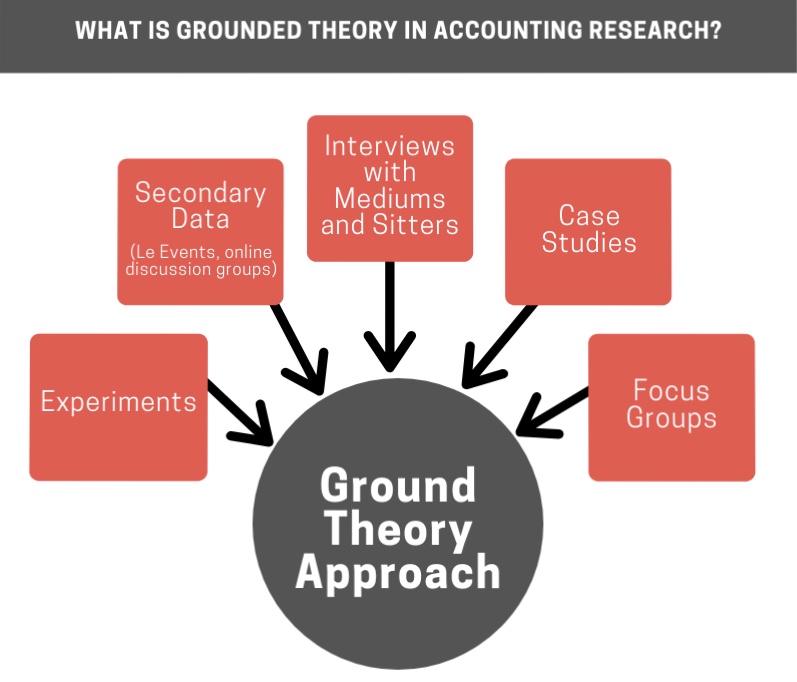What is Grounded Theory in Accounting Research?
Social science researchers have been facing few shortcomings of developing the theoretical methodology adopted by scientific methods in recent times. This may be due to making few essential factors are assumed to be a constant. The same problem exists in accounting research too. Thus, many researchers make use of the naturalistic approach like grounded theory method to make theoretical conclusions. The idea behind this grounded theory method is that it make use of the Data analysis and provides empirical evidence without any prior knowledge about the phenomena under study. Grounded theory is applicable not only to the accounting research; it has been widely used in many fields like medicine, social science research, organisational research, etc. In this blog, we will explore the meaning of grounded theory and its usage in accounting research.
As I mentioned earlier, grounded theory does not require any prior knowledge about the study and we just make empirical evidence from the data we collect. In accounting research, the data will mostly of qualitative in nature. Thus, scientist make use of qualitative research methods for evaluating complex phenomena. Well, grounded theory methods acts as a great tool in Qualitative research as the qualitative data can be collected easily and evaluated empirically.

In accounting research, one of the major concern regarding the objective of the research is that making methodical construction of accounting principles. And, grounded theory methods has been widely used in accounting research under various disciplines such as e-commerce, behaviour accounting, budget research, corporate governance research, etc to analyse the data and create a theory. Precisely, the grounded theory can be explained as; it is a method of research where the theories being developed from the data, not the reversal process as we see in many other research areas. In literature, there are two approaches for grounded theory. Though they do empirical findings but they differ in the use of sampling the data, encoding the data, and the development of theories (Boadu and Sorour, 2015). While these kinds of research is carried out by the students or researchers for their thesis purpose and there are many online services available nowadays and they conduct the research for this purpose and their services includes Statistical data analysis services, consultation for the statistical analysis for the research and dissertation, Data analysis services using SPSS, etc.
Implementing the grounded theory method for the qualitative research is not an easy task, since the grounded theory is used to model continuous collection of data (i.e) the data is still collected. The stages of this method involves several stages. Firstly, formulating the research problem in the form of questions. Next is to use the idea of theoretical studies. Though this concept does not involve any prior information about the phenomena, we collect the previous results for the comparison purpose with the new theory developed using this methodology. Third stage is to make use of sampling process and Data collection. One can use questionnaire method or observational method of data collection in this process, there are various sampling methodologies available in the statistical literature, and one can select the proper sampling idea for the data collection process. Nowadays, we can get help from other outsourcing organisation who provide services like conducting Statistical data analysis for business and market research, consultation for statistical analysis when the data is quantitative in nature, conducting a market research survey, etc., to the customers for improving their research and getting a valid conclusions out of that. Next stage is the analysis of data involving data cleaning, data reordering, compiling the data. Once these stages gets over, from the numerical results, one can draw inference about the research problem or problem statement or compare the results.
So far, we have discussed about the meaning of grounded theory and its various stages in the accounting research. However, the grounded theory has some limitations and challenges in accounting research. In practice, the scientist must keep away the theoretical knowledge before developing a new theory from any analytical results. Usually, the researchers often collect prior knowledge about the problem statement, so, one should be aware that the concept of grounded theory is to develop new theories from the data. One of the main limitation is that, scientists faces difficulties when the data results attains the final stage or maturity or efficient results has come up. Another important difficulty is that, the research should properly justify the objective of the study, satisfies all causal conditions and consequences. There are many Statistical services available nowadays to carry out this kind of research in a more appropriate manner that too in huge varieties of disciplines involving statistical analysis service related to Online retail, market research and analysing the data using statistical software’s like SPSS, conducting retail analytics for the data, etc.
Well there are many advantages of using the grounded theory, there is also several criticisms exists in practice. Firstly, it focuses on only the theories based on the empirical results and it may or may not be carry forward for general theory. Finally, the qualitative nature of the data is not fully utilised, as the researchers need to code it for the data analysis.
To sum up, the grounded theory is suitable for understanding or developing new theory or strategy using the empirical results from the data collected. This kind of research is well suited when the researcher have no prior information available about the complex phenomena. Precisely, the grounded theory is used to address the new problems in changing situations as it collects the data in a continuous manner or in a repeated manner. In addition, the grounded theory requires proper planning of the methodology, sampling strategy and method or mode of collecting the data. As the accounting research involves the data in the form of qualitative nature, and the grounded theory is the best suited and powerful analytical methodology.
References
- Alberti, A, L. Von and Al-Htaybat, K. (2010) ‘“Qualitative accounting research: an account of Glaser”s grounded theory’, Qualitative Research in Accounting & Management. pp. 208–226.
- Boadu and Sorour (2015) ‘“On Utilizing Grounded Theory in Business Doctoral Research: Guidance on the Research Design, Procedures, and Challenges”.’, International Journal of Doctoral Studies, 10, pp. 143–166.
- Budiasih (2014) ‘“Metode Grounded Theory dalamRisetKualitatif”, 9(1), pp. 19–27.’, JurnalIlmiahAkutansidanBisnis, 9(1), p. 19–27.
- Kirk, N. et. al. (2001) ‘“The use of grounded theory in accounting research”,’ Meditari Accountancy Research, 9(1), pp. 175–197.

 Previous Post
Previous Post Next Post
Next Post